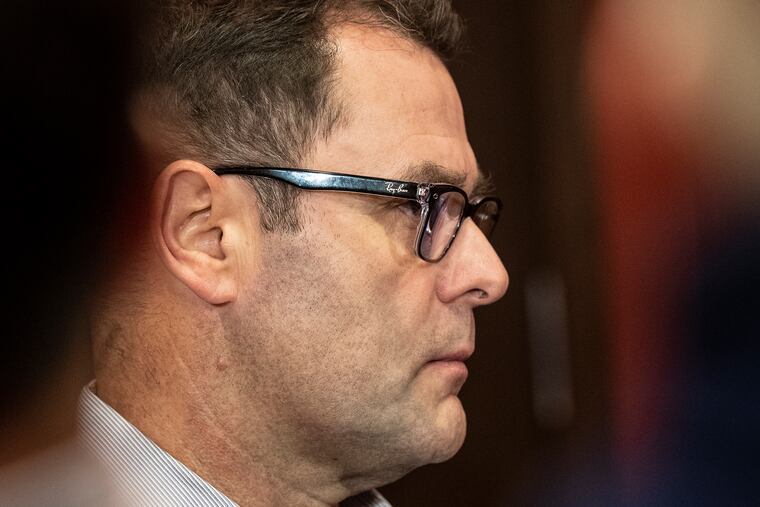Scott Gordon’s task: Get the Flyers to play the way they feel about each other | Sam Donnellon
Despite calling themselves a 'tight group', the Flyers have played as if they were waiting to be introduced to each other. Issues of communication, of detail and broken structure plagued their efforts.

There’s an old adage about coaching and it goes like this: A coach can be successful if he’s liked by all his players or disliked by all his players. It becomes dicey, though, when that room is split in half, pitting teammate against teammate, developing clubhouse lawyers, distracting from a common purpose.
Scott Gordon enters into a Flyers dressing room in which, to quote Scott Laughton in Vancouver the other day, is "a tight group off the ice.
"But it’s got to translate on the ice,'' he said. “And it’s gotta happen quick.”
Getting the Flyers to play with each other the way they feel about each other – that will be Gordon’s magic trick. Because for most of this season, and for chunks of the three that preceded it under Dave Hakstol, the Flyers have played as if they were waiting to be introduced to each other. Issues of communication, of detail and broken structure plagued their efforts. Their individual mistakes were so egregious and toxic that they often negated and masked the stellar minutes of play that surrounded them.
Gordon’s teams at Lehigh Valley have done the opposite. They are habitually among the AHL’s top teams in penalty kill, and are effective on the power play as well. He has made a name for himself at that level for not just evaluating talent correctly but for correcting the flaws of that talent.
Laughton, for example, blossomed after spending an entire season with Gordon in 2016-17.
"I think he’s a big reason I am here, to be honest,’’ said Flyers defenseman Robert Hagg. In two seasons under Gordon, Hagg morphed from a mistake-prone, offense-minded defenseman to a (mostly) responsible, hard-hitting, stay-at-home NHL regular.
"He made me the player I am today,’’ Hagg said. "So I have a lot to thank him for. It’s nice to see him here.’’
Nice to see ya – that’s not the emotion Gordon elicits at first. In early November, when I began asking about him among current Flyers and Phantoms, there were a few no-comments – albeit with a smile. Goaltender Alex Lyon admitted having a not-great relationship with him at first. But, he said, " I have improved a lot as a person and as a player.’’
"I truly think Scott Gordon comes to the rink every day and does his best to make the Flyers and the Phantoms better,’’ said Lyon. "Sometimes it's hard to see it. But I think he does care about his players.''
Hagg said the same thing. So did Travis Sanheim. You might recall Sanheim’s crisis of confidence last season that ultimately led to a January demotion after a particularly brutal game against the Devils.
"As soon as I got sent down, we had a meeting where he said, ‘I’m gonna get you back up there,’ ’’ Sanheim said of Gordon. "He said, `We’re going get your game where it needs to be and get that confidence back.' He just worked with me every day, gave me the confidence to play all different situations and heavy minutes. We would go over video after games [in which] I thought I played really well. And he would say, `There are still little things and areas for you to pick up on.’ And he was right.’’
"It’s the small details,’’ Hagg said. "He was on me for the small details all the time. What to do with the puck, how to play it, what to look for. I mean, small things like that. Always make the simple play first to get it out of the D zone and everything else will get taken care of. He taught me that and stuck with it, kept pushing me all the time to make the simple play to get it out of the D zone … ’’
If that sounds familiar, it should. Hakstol said many of those same things, right up to the day he was shown the door. Gordon knows that feeling. Wildly successful as an AHL coach in Providence before going to the NHL, he was canned into his third season as New York Islanders coach in 2010 because he struggled to connect with that team, and rarely let up on the throttle.
This experience is much different. For one, he has coached 11 of the players that make up this team. He knows their skill set, their athletic personalities, how responsive they are to criticism. For another, he is older -- 55 -- and wiser and perhaps even more chagrined than in his spitfire days on Long Island.
"As a coach, you have to be who you are,’’ he said. "But it’s a little bit different when you’re dealing with younger players because a lot of them have never been told no. So sometimes they’re hard conversations. But you have the players' best interests at heart. And hopefully they find value in what you’re saying.’’
He inherits a team looking for that, for anything that would reclaim their collective sense of self-worth. They want to like him, play for him, reclaim their season even.
It’s a tall task. But at this point, what do they or he have to lose?